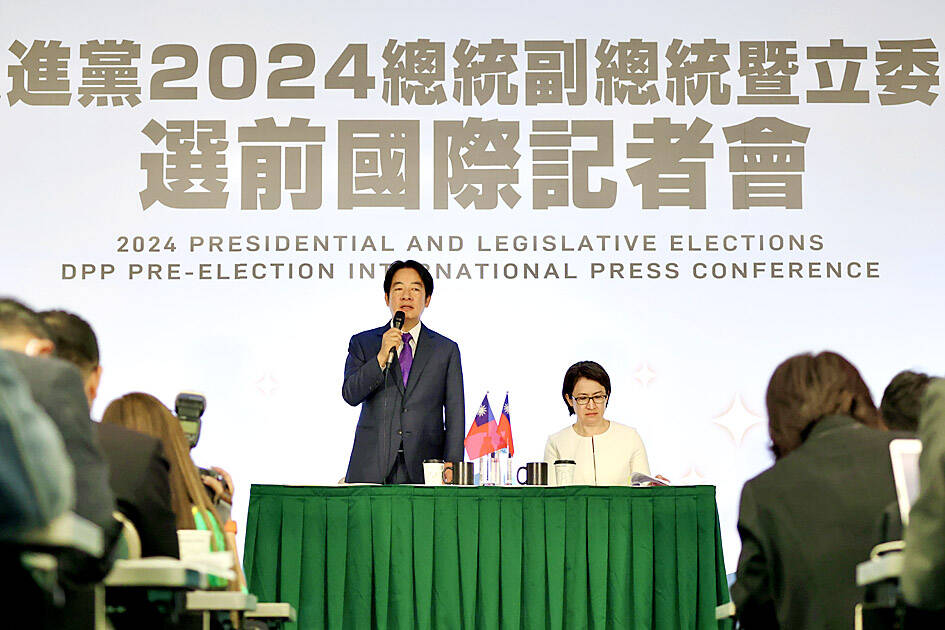Vice President William Lai (賴清德), the Democratic Progressive Party’s (DPP) presidential candidate, yesterday said that he would maintain the “status quo” and pursue peace through strength if elected, remaining open to engagement with Beijing under the preconditions of equality and dignity.
Lai pledged to try to engage with China, as dialogue could decrease cross-straits risks, and said peaceful development is in the best interests of both sides and the rest of the world.
“Peace is priceless and war has no winners,” Lai said at a news conference in which he appeared alongside DPP vice presidential candidate Hsiao Bi-khim (蕭美琴).

Democratic Progressive Party (DPP) presidential candidate Vice President William Lai, left, and DPP vice presidential candidate Hsiao Bi-khim hold a news conference in Taipei yesterday.
Photo: Ritchie B. Tongo, EPA-EFE
However, “accepting China’s one principle proposition is not true peace,” Lai said. “Peace without sovereignty is just like Hong Kong. It is fake peace.”
The DPP and the Chinese Nationalist Party (KMT), which traditionally favors closer ties with China, have committed to bolstering Taiwan’s defenses.
Both say only Taiwan’s 23 million people can decide their future, although the KMT says it strongly opposes independence.
“There is an expectation among the international community that [we] maintain the ‘status quo,’” Lai said, adding that this “is [the responsibility] that both sides of the Taiwan Strait need to bear together.”
“We have no plan” to declare Taiwanese independence, because “the Republic of China, Taiwan, is already an independent sovereign nation,” Lai said.
Lai said that he would continue the policy direction of President Tsai Ing-wen (蔡英文), including efforts to maintain the “status quo” in the Taiwan Strait and expand links with democratic nations.
Lai said that a DPP victory would pave the way for Beijing to “reassess its policy toward Taiwan,” as it would showcase Taiwanese voters’ support for the nation’s current direction and render Chinese interference operations in favor of his opponents futile.
“My being elected would be helpful for creating a new situation in the Indo-Pacific region” that would contribute to the stability of the Taiwan Strait, Lai said.
Lai also said if elected, Taiwan would continue to build up its defense deterrence amid geopolitical tensions. Since the previous election in 2020, China’s People’s Liberation Army has markedly stepped up military exercises around Taiwan.
“The pursuit of peace relies on strength, not the goodwill of the aggressor,” Lai said, vowing to bolster both the military and the economy.
Former representative to the US Hsiao said that facing the restructuring of the global economy, Taiwan — home to the world’s largest contract chipmaker, Taiwan Semiconductor Manufacturing Co (台積電) — must maintain its competitiveness and key position in supply chains.
“In order for Taiwan’s economic strength to grow, it is necessary to integrate with the world,” Hsiao said.
Lai said the election would serve as a “testament to our commitment to democracy,” while also adding that China’s interference in the presidential and legislative elections has been the “most serious” yet.
Additional reporting by CNA
Source: Taipei Times - 2024/01/10




















